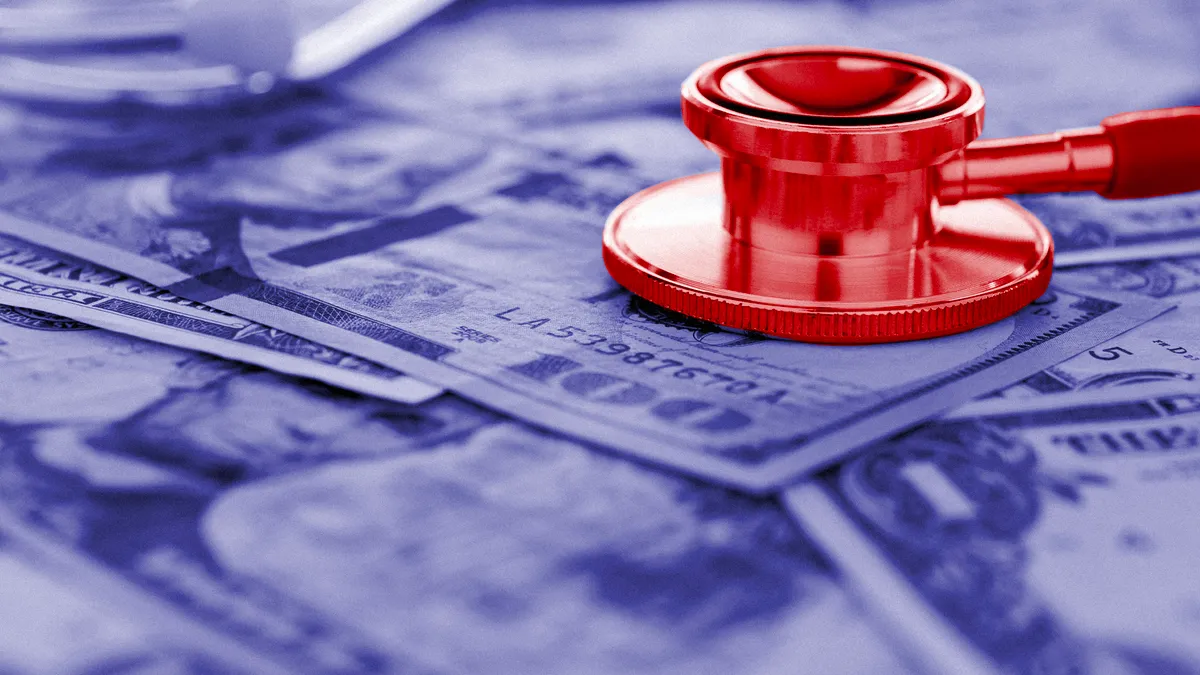Medtech companies navigated obstacles ranging from soaring inflation and supply chain bottlenecks to procedure delays tied to clinician shortages in the third quarter. Abbott Laboratories CEO Robert Ford said the three-month period was "probably our most challenging."
A stronger dollar had a damping effect on international sales across the sector. Analysts at Needham said the currency impacts have intensified, causing a number of companies to lower their forecasts for the year.
“Both inflation and currency are likely to remain headwinds in 2023 and to result in below-normal EPS growth for most companies,” the analysts said in a research report.
While hospital procedure volumes are recovering from the worst levels seen at the start of the pandemic, the aftershocks are still being felt by device makers. Stifel analysts, after listening to Stryker's earnings call, said industry fundamentals appear to be gradually stabilizing. "Headwinds are expected to persist through 2022 and likely into early 2023," they wrote in a research note.
The challenges led a handful of medtechs to announce workforce reductions or restructurings. Here's a rundown of how companies in the sector fared in the latest quarter:
Abbott Laboratories: Net profit dropped 32% to $1.44 billion as revenue slid 4.7% to $10.41 billion. Both medical device and diagnostics sales weakened, but higher-than-expected sales of COVID-19 tests prompted the company to raise its full-year earnings forecast.
Baxter: The net loss widened to $2.9 billion from $450 million in the year-earlier quarter because of a $3.1 billion impairment charge from the acquisition of connected care firm Hillrom. Revenue climbed 17% to $3.8 billion, boosted by higher sales of renal care and medication delivery products.
BD: While revenue fell 1.8% to $4.8 billion, it beat analyst forecasts and earnings from continuing operations doubled to 92 cents a share. Medication delivery and management revenue outperformed even as sales in the surgery business were below estimates.
Boston Scientific: Revenue rose 8.1% to $3.17 billion, surpassing the company's forecast. It was boosted by higher sales of heart and vascular devices. Still, net income fell 55% to $188 million, hurt by foreign-exchange rates and higher expenses.
Dexcom: Net income at the maker of continuous glucose monitors increased 16% to $101.2 million on an 18% rise in revenue to $769.6 million. The company confirmed a projected timeline for approval from the Food and Drug Administration of its G7 CGM in the fourth quarter.
Edwards Lifesciences: The heart valve replacement specialist posted gains in sales and profit as hospital staffing shortages hurt procedure volumes. Net income rose 1% to $343.5 million on a 1% increase in revenue to $1.32 billion, which fell short of analyst estimates.
GE HealthCare: Profit climbed 1% to $712 million on a 6% increase in revenue to $4.61 billion, spurred by higher orders of imaging and ultrasound equipment. CEO Peter Arduini predicted supply chain pressures would improve into 2023.
Hologic: Revenue fell 28% to $953 million as demand cooled for COVID-19 tests, though it exceeded the company's forecast. Net income plunged 64% to $118.7 million, with semiconductor chip shortages dragging on the breast health unit.
Illumina: The DNA sequencing company is reducing its global workforce by 5% after reporting a per-share loss of $24.26, as inflation, currency and supply chain pressures persisted. Revenue rose 1% to $1.12 billion, in line with a previously lowered forecast.
Insulet: Revenue jumped 24% to $340.8 million as the Omnipod insulin pump achieved its highest U.S. sales growth rate in a decade. A net loss of $5.2 million, compared to year-earlier income of $12.6 million, reflected a charge to replace an Omnipod DASH pump component.
Intuitive Surgical: The robotic-assisted surgery provider reported a 1.5% decline in non-GAAP income to $429 million, while revenue gained 11% to $1.56 billion. Da Vinci robot procedures rebounded 20% from a year ago, and system placements, while down, exceeded Goldman Sachs analysts' estimates.
iRhythm: The maker of wearable cardiac monitors had a net loss of $21.4 million with revenue rising 22% to $103.9 million. The company cut its full-year revenue forecast because of product returns, which it blamed on having too few staff to train customers.
Johnson & Johnson: Medical device revenue rose 2.1% to $6.78 billion as patient procedure volumes recovered. Still, foreign-exchange fluctuations and persistent inflation caused the company to cut its full-year sales forecast and hospital staffing shortages remained a challenge.
Labcorp: Net income slid 40% to $352.8 million on an 11% decline in revenue to $3.6 billion as the medical testing company faced a drop-off in COVID-19 test volumes, higher labor costs and a struggle to hire enough workers.
Medtronic: Medtronic said procedures recovered slower than expected, leading the company to lower its forecast for the remainder of its 2023 fiscal year. Revenue fell 3% to $7.6 billion in the company's fiscal second quarter, and net income decreased by 67% to $427 million.
Pear Therapeutics: The health app developer said it will cut 22% of its staff because of the challenging macroeconomic environment even as revenue grew 24% to $4.1 million. A net loss of $30.7 million was little changed from the loss in the year-earlier quarter.
Philips: The medical device maker said it will cut about 5% of its workforce after recording a net loss of €1.33 billion ($1.37 billion) tied to recalls of its faulty sleep respirators and continuing supply chain issues. Comparable sales increased 5% to €4.31 billion.
Quest Diagnostics: The laboratory services provider reported a 10% slump in revenue to $2.49 billion as demand for COVID-19 testing declined, while adjusted earnings sank 40% to $2.36 a share. Still, the company raised its full-year sales forecast as it focuses on advanced diagnostics and consumer-initiated testing.
ResMed: Net income climbed 3.4% to $210.5 million, lifted by a 5% increase in revenue to $950.3 million. The maker of sleep apnea devices continued to benefit from rival Philips' massive recall of CPAP and BiPAP ventilators.
Siemens Healthineers: Revenue climbed 16% to €6 billion ($6.2 billion), topping analyst estimates. Sales were boosted by growth in the imaging business. Net income rose 36% to €636 million. A restructuring of the diagnostics unit is planned after inflation, logistical issues and a delayed product launch outweighed operational improvements.
Stryker: Revenue rose 7.7% to $4.5 billion. Double-digit hip and knee sales were buoyed by a recovery in elective procedures despite ongoing hospital staffing shortages. Net profit surged 88% to $2.14 a share, although it was below Stifel analysts’ estimates as currency translations and chip shortages weighed on results.
Thermo Fisher: Better-than-expected COVID-19 test sales helped push revenue up 14% to $10.68 billion, exceeding the company's forecast. Still, COVID-19 testing sales slowed overall and net income declined 13% to $2.0 billion.
3M: Healthcare adjusted EBITDA declined 10% to $603 million, while healthcare sales rose 1.7% to $2.1 billion on an organic basis, curbed by hospital staffing shortages. The company plans to spin off its healthcare technology business next year.
Zimmer Biomet: Net income climbed 33% to $194 million on a 1% revenue decline to $1.67 billion, with strong demand for hips and knees offset by lower sales to China. Goldman Sachs analysts said the orthopedic device maker is gaining market share and poised to recoup revenue lost in the pandemic.

















